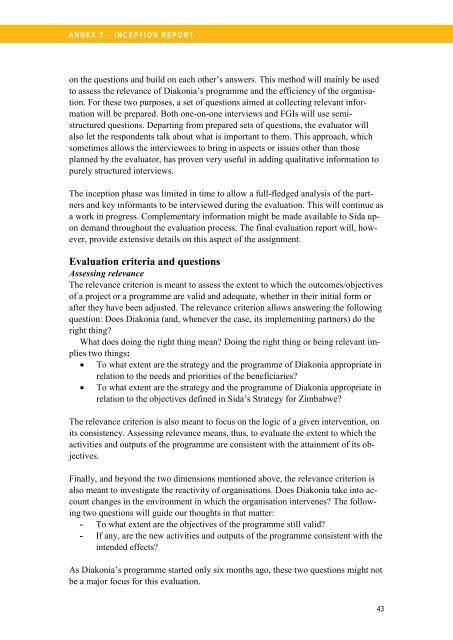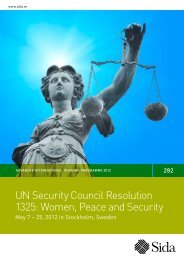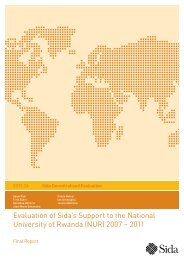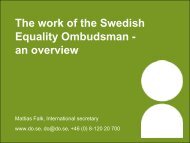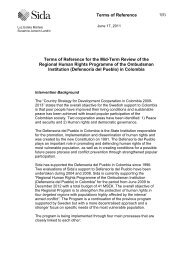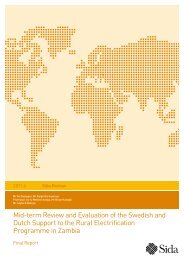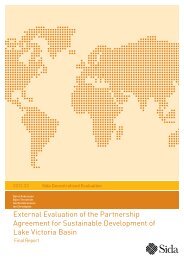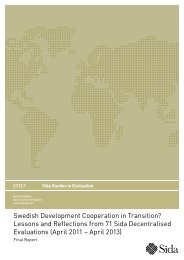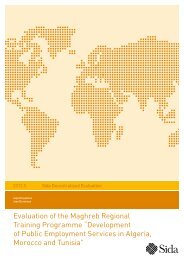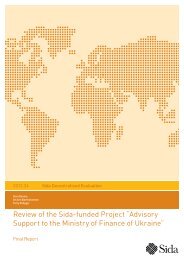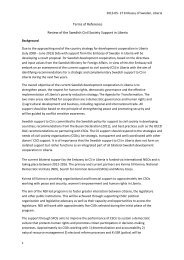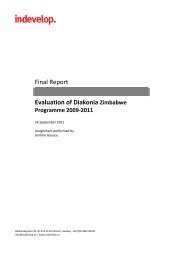Mid-term Review of the Diakonia Strategic Peace Building ... - Sida
Mid-term Review of the Diakonia Strategic Peace Building ... - Sida
Mid-term Review of the Diakonia Strategic Peace Building ... - Sida
Create successful ePaper yourself
Turn your PDF publications into a flip-book with our unique Google optimized e-Paper software.
A N N E X 2 – I N C E P T I O N R E P O R T<br />
on <strong>the</strong> questions and build on each o<strong>the</strong>r’s answers. This method will mainly be used<br />
to assess <strong>the</strong> relevance <strong>of</strong> <strong>Diakonia</strong>’s programme and <strong>the</strong> efficiency <strong>of</strong> <strong>the</strong> organisation.<br />
For <strong>the</strong>se two purposes, a set <strong>of</strong> questions aimed at collecting relevant information<br />
will be prepared. Both one-on-one interviews and FGIs will use semistructured<br />
questions. Departing from prepared sets <strong>of</strong> questions, <strong>the</strong> evaluator will<br />
also let <strong>the</strong> respondents talk about what is important to <strong>the</strong>m. This approach, which<br />
sometimes allows <strong>the</strong> interviewees to bring in aspects or issues o<strong>the</strong>r than those<br />
planned by <strong>the</strong> evaluator, has proven very useful in adding qualitative information to<br />
purely structured interviews.<br />
The inception phase was limited in time to allow a full-fledged analysis <strong>of</strong> <strong>the</strong> partners<br />
and key informants to be interviewed during <strong>the</strong> evaluation. This will continue as<br />
a work in progress. Complementary information might be made available to <strong>Sida</strong> upon<br />
demand throughout <strong>the</strong> evaluation process. The final evaluation report will, however,<br />
provide extensive details on this aspect <strong>of</strong> <strong>the</strong> assignment.<br />
Evaluation criteria and questions<br />
Assessing relevance<br />
The relevance criterion is meant to assess <strong>the</strong> extent to which <strong>the</strong> outcomes/objectives<br />
<strong>of</strong> a project or a programme are valid and adequate, whe<strong>the</strong>r in <strong>the</strong>ir initial form or<br />
after <strong>the</strong>y have been adjusted. The relevance criterion allows answering <strong>the</strong> following<br />
question: Does <strong>Diakonia</strong> (and, whenever <strong>the</strong> case, its implementing partners) do <strong>the</strong><br />
right thing?<br />
What does doing <strong>the</strong> right thing mean? Doing <strong>the</strong> right thing or being relevant implies<br />
two things:<br />
To what extent are <strong>the</strong> strategy and <strong>the</strong> programme <strong>of</strong> <strong>Diakonia</strong> appropriate in<br />
relation to <strong>the</strong> needs and priorities <strong>of</strong> <strong>the</strong> beneficiaries?<br />
To what extent are <strong>the</strong> strategy and <strong>the</strong> programme <strong>of</strong> <strong>Diakonia</strong> appropriate in<br />
relation to <strong>the</strong> objectives defined in <strong>Sida</strong>’s Strategy for Zimbabwe?<br />
The relevance criterion is also meant to focus on <strong>the</strong> logic <strong>of</strong> a given intervention, on<br />
its consistency. Assessing relevance means, thus, to evaluate <strong>the</strong> extent to which <strong>the</strong><br />
activities and outputs <strong>of</strong> <strong>the</strong> programme are consistent with <strong>the</strong> attainment <strong>of</strong> its objectives.<br />
Finally, and beyond <strong>the</strong> two dimensions mentioned above, <strong>the</strong> relevance criterion is<br />
also meant to investigate <strong>the</strong> reactivity <strong>of</strong> organisations. Does <strong>Diakonia</strong> take into account<br />
changes in <strong>the</strong> environment in which <strong>the</strong> organisation intervenes? The following<br />
two questions will guide our thoughts in that matter:<br />
- To what extent are <strong>the</strong> objectives <strong>of</strong> <strong>the</strong> programme still valid?<br />
- If any, are <strong>the</strong> new activities and outputs <strong>of</strong> <strong>the</strong> programme consistent with <strong>the</strong><br />
intended effects?<br />
As <strong>Diakonia</strong>’s programme started only six months ago, <strong>the</strong>se two questions might not<br />
be a major focus for this evaluation.<br />
43


